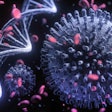
It's been well over a year since the start of the COVID-19 pandemic, yet at-home self-testing remains as crucial as ever to prevent the spread of the SARS-CoV-2 virus. The healthcare industry continues to see the development of new tests, including two recent polymerase chain reaction (PCR)-based SARS-CoV-2 tests from STS Lab Holdco, a subsidiary of Amazon, and one from the Cleveland Clinic.
These COVID-19 tests were granted separate emergency use authorizations (EUAs) from the U.S. Food and Drug Administration (FDA) earlier in 2021 and all require nasal swab specimens from patients.
The first of the newly approved tests from Amazon, the Amazon Multi-Target SARS-CoV-2 Real-Time RT-PCR Test, detects SARS-CoV-2 nucleic acid in anterior nasal swab specimens that can be self-collected at Amazon facilities using either the Amazon COVID-19 Collection Kit or Amazon On-Site COVID-19 Test Collection Kit.
The second test, the Amazon COVID-19 Test Collection Kit DTC, allows SARS-CoV-2 nucleic acid in individual anterior nasal swab specimens to be self-collected at home. Both tests allow for testing of pooled samples containing up to five individual self-collected anterior nasal swab specimens, and both tests can only be performed by STS Labs Holdco-designed labs that are CLIA-certified to perform high-complexity tests.
The tests aren't Amazon's first investments in the COVID-19 testing market. Previously, in March 2021, Amazon received an FDA EUA authorization for a COVID-19 test made by STS Lab Holdco. The Amazon Real-Time RT-PCR Test for Detecting SARS-CoV-2 was authorized for anterior nasal swab specimens self-collected using either the Amazon COVID-19 Collection Kit under the supervision of a healthcare provider or the Amazon COVID-19 Test Collection Kit unsupervised at home as part of an at-home kit where a patient takes their own sample and mails it to a centralized lab.
Prior to that, in January 2021, Amazon began selling at-home COVID-19 testing kits made by Los Angeles-based genomics company DxTerity. The at-home testing kits were an expansion of Amazon's interest in COVID-19 tests and diagnostics in general. Meanwhile, during summer 2020, Amazon launched a program to build its in-house COVID-19 testing lab. By October 2020, the company said it had the infrastructure to run tens of thousands of tests for employees daily.
The third newly approved test, the Cleveland Clinic's SelfCheck COVID-19 TaqPath Multiplex PCR, detects SARS-CoV-2 nucleic acid in anterior nasal swab specimens self-collected at home using the SelfCheck COVID-19 Swabbing Kit. The Cleveland Clinic test runs a specific workflow of Thermo Fisher Scientific's TaqPath COVID-19 Combo Kit, which received an EUA in March 2020. The Cleveland Clinic has been granted a right of reference to data to support the use of the SelfCheck COVID-19 Swabbing Kit with TaqPath COVID-19 Combo Kit by Thermo Fisher. The FDA stated that the SelfCheck COVID-19 TaqPath Multiplex PCR test can only be performed at the Cleveland Clinic.
Examining the prospects for at-home testing, Kalorama Information in a report titled "At-Home Testing: COVID-19 Trends and Future Potential" pinpoints a number of events that bode well for the future of COVID-19 home tests. Diagnostic product manufacturers and researchers can expect the following positive outcomes:
- Continued interest in self-tests (home) as a tool to detect asymptomatic virus carriers and thus slow infection rates
- Increased government support for self-testing
- Investment in innovative technologies that make home tests cheaper, more user friendly, and therefore increased demand for over-the-counter (OTC) and direct-to-consumer (DTC) tests
- Wide dissemination of COVID-19 information in the media and on the internet has spawned a more informed population that is better prepared to self-test
On the other hand, the bad news for the future of COVID-19 home tests is the following:
- The pandemic will not last forever, and so consumer demand for COVID-19 home tests will decrease. An example is that home flu tests have not captured the imagination of most consumers.
- The increasing number of viral variants will put more emphasis on lab-based molecular technologies that can detect variants.
- SARS-CoV-2 will become endemic and join the family of seasonal respiratory disease pathogens. As such, panels of respiratory viruses that include SARS-CoV-2 will probably replace single analyte COVID-19 tests.
From a public health perspective, self-tests can offer advantages when used to complement professionally administered rapid tests or lab-based tests. The Kalorama report said self-tests allow individuals to obtain results very quickly, which can support the early detection of infectious cases and reduce further community transmission. This has been demonstrated with glucose tests and colon cancer tests that are commonly sold for home use.
Daniel Granderson is associate editor for Kalorama Information, part of Science and Medicine Group. Kalorama's market report on at-home COVID-19 tests can be found on Kalorama's website.
Disclosure: LabPulse.com is a sister company of Kalorama Information.



















